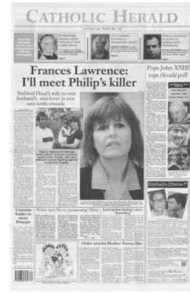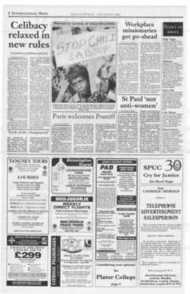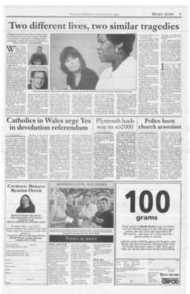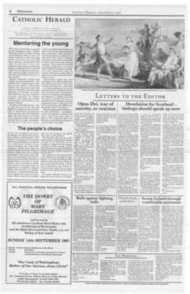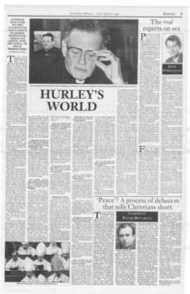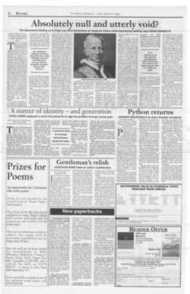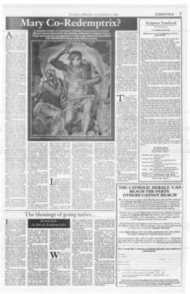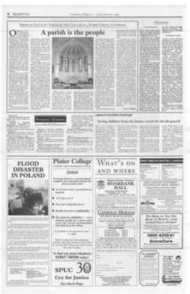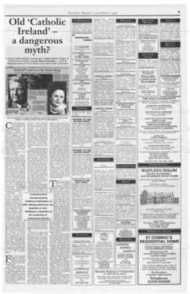Page 6, 22nd August 1997
Page 6

Report an error
Noticed an error on this page?If you've noticed an error in this article please click here to report it.
Tags
Share
Related articles
Call To Revise Orders Ban
An Unswerving Anglican Order
Anglicans See Vatican Out Of Step On Arcic Report
Anglo-catholics And Road To Unity
•
Absolutely null and utterly void?
Anglican Orders: the Documents in the Debate, edited by Christopher Hill and Edward Yarnold SJ, Canterbury Press £30.
THERE ARE, speaking broadly, three ways in which members of the Church of England look on the Roman Catholic Church. If they are true protestants, they long to reform it completely provided they have not come to the conclusion that it is too corrupt to reform. If, like the majority, they are middle-ofthe-road, they will settle for coexistence, believing that Romanism, while not for them, is fine for those who like that sort of thing. If they are Anglo-Catholics, they wish to belong: they see themselves as already Catholics in belief and practice, cut off by a series of historical accidents frbm communion with the Ste of Rome. They desire reform to the extent that it is necessary to accommodate them: if they are married clergymen, by a modification of the rule of celibacy; for most, relaxation of the centralization of Rome, some soft pedalling of Petrine supremacy and Marian dogmas.
As a convert clergyman, I am surprised at the ignorance of the Church of England that I encounter among fellow Catholics. Long years ago, when I was first ordained in that Church, I encountered a Catholic friend from Oxford days who said "You should be a papist, not an apist". He was being rude: he was right to say I should be a papist, but he was wrong to think I was an apist, a mere mountebank. Like every Anglican, I believed in the validity of my Orders and accordingly of the sacraments I administered.
It is impossible to suppose that men like Dr Pusey, Mr Gladstone, Lord Halifax or to come down to our own day Fr Graham Leonard when he was Bishop of London, did not believe 100 per cent in the reality of their ecclesial position.
Archbishop Fisher used to insist that the Church of England had no doctrine of her own, only the doctrine of the undivided Church. It was he who, by his sudden visit to Pope John XXIII in 1960, initiated the phase of official discussion with a view to corporate reunion, leading to the establishment of the Anglican/Roman Catholic International Commission (ARCIC), on which the two editors of this book served.
One factor, but only one among many, that had to be examined was that of validity: are Anglican bishops, priests and deacons really bishops, priests and deacons, or not? Every English Catholic knows the answer: in 1896 the Pope declared, in the Bull Apostolicae Curae, that their orders are "absolutely null and utterly void". This book contains the essential documents underlying that decision, translated into English where necessary. It also contains the English text of the Bull itself; and the Responsio of the Archbishops of Canterbury and York, Saepius Officio, addressed to "the whole body of Bishops of the Catholic Church", notable for the courtesy with which it speaks of "our venerable brother Pope Leo XIIIth" acknowledging that "the things which [he] has written from time to time... are
sometimes very true and always written with a good will" a far cry from the "Antichrist" and "Whore of Babylon" of Reformation polemic.
As things stand, for us Catholics, Rome has spoken and the case is closed.
It would be wrong to speak of ARCIC in terms of "success" or "failure": the Commission succeeded if it found out the truth, regardless of whether its conclusions matched the aspirations of those who participated or waited for its outcome. (Oh, how we prayed that it would be the "right" one!) That was not within the providence of God.
If, but only if, the two Churches had come to a common mind on doctrine, discipline, jurisdiction and authority, then the validity or otherwise of Anglican orders would have played a crucial part in the means by which reunion might have been effected.
We are now on new ground. At Easter 1994 the Church of England conferred its priesthood on women. Who can deny that this is a novelty, contrary to the opinion of the vast majority of the Church, both Eastern and Western? It cannot be made to square with the Vincentian Canon "quod ubique, quod semper, quod ab omnibus creditum est" what has been believed everywhere, always, and by all; it demolishes Archbishop Fisher's assertion about the doctrine of the Church of England. To my understanding there can be no corporate reunion between Canterbury and Rome unless and until either the Church of England ceases to ordain women (theoretically possible, but morally most improbable), or the Church of Rome adopts the practice (which we have recently been assured, on the highest authority, she lacks the power to do). It is almost as if the Church of England determined by one rash act to demonstrate that Leo was right.
Anglican Orders is edited by Christopher Hill, the Bishop of Stafford, for many years the Archbishop of Canterbury's Secretary for Ecumenical Affairs, and Fr Edward Yarnold, a Jesuit from Campion Hall. Both Churches are deeply indebted to the two of them not only for their dedication to the cause of reunion but also for their publications, notably Anglicans and Roman Catholics the Search for Unity. And now this: modestly they describe it as "a volume which is not likely to find a place on the list of best sellers"; but I trust that a reprint is soon called for.
It is, however, emphatically a book for the specialist; it assumes in the reader either a working knowledge of the events it documents, or ready access to a narrative of them, such as the editors' earlier work. For instance, nowhere (that I could find) is a date given for the letter of Fr Portal to the Moniteur de Rome. Some documents are dated at their head or at their foot, others only by reference to the Bibliography. The identity of the "Willelm:Ebor:" who signs Saepius Officio can be discovered only by reference to "York" in the Index, where he turns out to be William McLagan, the notoriously absent-minded Archbishop of York, now himself almost forgotten except as the composer of the droopy tune to "Bread of Heaven, on thee we feed." The Index is a model of what an index to such a book should be.
Traduttore traditore to some extent he who translates is a traitor to the original. So far as I can tell, all the translations here are accurate as well as elegant. I am amazed as well as delighted by the grace and charity with which controversies were carried on in those far-off days; for me, this has become bedside reading.
The editors end their Preface with a quotation from Fr Gasperi which they make their own, and which even now, after all that has happened, retains its nobility: "Christian charity compels us to hasten the return of the great English nation to Catholic unity, in the first place by the courtesy of our discussions... and above all by our prayers. 'May there be one flock and one shepherd'. Amen."
blog comments powered by Disqus


